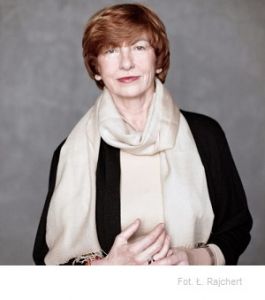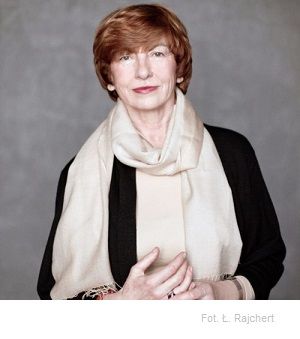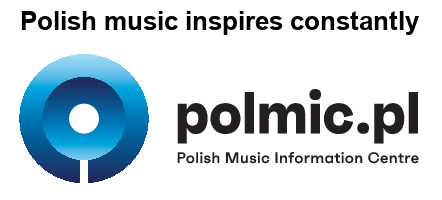Sikora Elżbieta
-
composer
composer, b. 20 October, 1943, Lviv. She studied sound engineering at the Higher State School of Music in Warsaw (now the Fryderyk Chopin University of Music) under Antoni Karużas and, between 1968-1970, electroacoustic music under Pierre Schaeffer and François Bayle (Groupe de Recherches Musicales) in Paris.
After having returned to Warsaw, she studied composition under Tadeusz Baird and Zbigniew Rudziński at the Higher State School of Music in Warsaw. In 1973, with Krzysztof Knittel and Wojciech Michniewski, she organised the KEW composers group which played in Poland, Sweden, Austria and Germany.
Later she took part in a computer music course at IRCAM and studied under Betsy Jolas. Having got a scholarship of the French government, the City of Mannheim and the Kościuszko Foundation, she studied under John Chowning at the CCRMA - Center for Computer Research in Music and Acoustics, Stanford University, California. In 1999, she gained the title of doctor of composition at the Music Academy in Wrocław.
She taught at the Université Paris-Est Marne-la-Vallée, University of Chicago, at the composition couses in Gdańsk, Munich, Hamburg and Ulm and, in 1985-2008, she lectured electro-acoustic music composition at the Conservatory and the École européenne supérieure de l’image in Angoulême.
Since 1981, she has lived in France, being still involved in music life in Poland. She is a member of the Polish Composers' Union (since 1978) and visiting professor at the Fryderyk Chopin University of Music. In 2011-2016, she was artistic director of the Musica Electronica Nova festival in Wrocław.
Utwory Elżbiety Sikory prezentowane były m.in. na „Warszawskiej Jesieni”, „Poznańskiej Wiośnie Muzycznej”, Avignon Festival, Festival Estival w Paryżu, „Syntèse” w Bourges, Festival ICMC w Bukareszcie, Brighton L’Espace du Son, Festival Acousmatique de Bruxelles, „Fylkingen” w Stockholmie, Dresden Music Festspiele, Braunschweig Festival, Berlin Festspiele, Alexandria Festival of the Arts, Bath – Newcastle Festival, Heidelberg New Music Festival, Antidogma Musica w Torino, Festival International de Musica Electroacustica w Hawanie, Seoul International Computer Music Festival w Korei Południowej, EMF Festival New York, International Festival of Today’s Music w Nowym Jorku. Wykonywały je m.in. zespoły Teatru Wielkiego – Opery Narodowej w Warszawie, Warszawskiej Opery Kameralnej, Ballet of Monte Carlo, Annabella Gonzales Danse Theater, Centre Pompidou, Orkiestra Filharmonii Narodowej, Orkiestra Filharmonii Poznańskiej, Orkiestra Filharmonii Bałtyckiej, Narodowa Orkiestra Symfoniczna Polskiego Radia, Nouvel Orchestre Philharmonique de Radio France, Orchestre Poitou-Charentes, Orchestre Stadt Ulm, Kwartet Wilanów, Camerata Varsovia, Ensemble Itinéraire, Ensemble 2E2M, Ensemble Aventure, Heidelberg Festival Ensemble, Danel Quartet, pod batutą takich dyrygentów, jak Antoni Wit, Michel Tabachnik, Pascal Verrot, Wojciech Michniewski, Jacek Kasprzyk, Gabriel Chmura, Tadeusz Wojciechowski, Annick Minck, Jean Thorel, James-Alain Gaehres. Zostały też nagrane przez Polskie Radio, WRD i Radio France.
Elżbieta Sikora's compotions were performed at numerous festivals: "Warsaw Autumn” International Festival of Contemporary Music, "Poznań Music Spring”, Avignon Festival, Festival Estival in Paris, „Syntèse” in Bourges, Festival ICMC in Bucharest, Brighton L’Espace du Son, Festival Acousmatique de Bruxelles, "Fylkingen” in Stockholm, Dresden Music Festspiele, Braunschweig Festival, Berlin Festspiele, Alexandria Festival of the Arts, Bath – Newcastle Festival, Heidelberg New Music Festival, Antidogma Musica in Torino, Festival International de Musica Electroacustica in Hawana, Seoul International Computer Music Festival, South Corea, EMF Festival New York, International Festival of Today’s Music in New York. Her works have been played by the ensemble of the Grand Theatre - National Opera in Warsaw, Warsaw Chamber Opera, Ballet of Monte Carlo, Annabella Gonzales Danse Theater, Centre Pompidou, Warsaw Philharmonic - National Orchestra of Poland, Poznań Philharmonic Orchestra, Baltic Philharmonic Orchestra, Polish National Radio Syphony Orchestra, Nouvel Orchestre Philharmonique de Radio France, Orchestre Poitou-Charentes, Orchestre Stadt Ulm, Wilanów Quartet, Camerata Varsovia, Ensemble Itinéraire, Ensemble 2E2M, Ensemble Aventure, Heidelberg Festival Ensemble, Danel Quartet, under such conductors as Antoni Wit, Michel Tabachnik, Pascal Verrot,Wojciech Michniewski, Jacek Kasprzyk, Gabriel Chmura, Tadeusz Wojciechowski, Annick Minck, Jean Thorel, James-Alain Gaehres. Her compositions have been recorded by the Polish Radio, WRD and Radio France.
Elżbieta Sikora has awarded with numerous prizes and medals. For the Ariadne (1977), she won the 2nd prize at the Carl Maria von Weber Competition in Drezden in 1978, She was awarded at the Competition of Electroacoustic Music in Bourges in 1980 for Lettres à M. pour bande (1980) and Barren Land (1979). In 1982, for Guernica - hommage à Pablo Picasso (1975-1979) she got the 1st prize at the Female Composers’ Competition in Mannheim. In 1994, she gained two SACEM awards: Prix pédagogique for Chant' Europe (1993) and - for her entire artistic work - Prix du printemps. In 1996, she got he award of the Société des Auteurs et Compositeurs Dramatiques for the opera Heart Extractor (1984-1986). In 1997, she was honoured with the Commander's Cross of the Order of Merit of the Polish Republic. In 2002, she received the Special Distinction of the l'Académie du Disque Lyrique in Paris for Le Chant de Salomon (1992) and Eine Rose als Stütze (2000), released on the album Chant du Monde / Harmondia Mundi. In 2004, from the French Minister of Culture ,she got the highest French distinction - Chevalier de l'Ordre des Arts et des Lettres. In 2008, in a poll of the "Gazeta Wyborcza" daily she was awarded the "Sztorm Roku" prize for Oliwa Concerto (2007) in the category: classical music. For her opera "Madame Curie", she got "Splendor gedanensis” award of the City of Gdańsk in the cathegory: culture, and Pomerania Artistic Award (2012). In June 2013, an audio-visual recording of that opera (performed by the Baltic Opera in Gdańsk conducted by Wojciech Michniewski and directed by Marek Weiss) gained Orphée du Prestige Lyrique de l'Europe de l'Academie du Disque Lyrique. W 2013, she received the Annual Award of the Polish Composers' Union for "outstanding composition output, the opera Madame Curie and her work as cultural activities organiser”. In the same year, she was honoured by the Minister of Culture and National Heritage of the Polish Rapublic with the Bronze Medal for Merin to Culture - Gloria Artis.
updated: February 2016 (wa), March 2017 (iz)
Artist's website: www.elzbietasikora.com
Compositions
Interventions pour tuba, 2 percussions et bande (1969)
Prénom na taśmę (1970)
Widok z okna na taśmę (1971)
L’incertitude de l’été pour bande (1973)
Pieśni rozweselające serce [wersja I] na sopran i pięć instrumentów (1973)
Kwartet smyczkowy nr 1 [wersja I] (1975)
Podróż pierwsza [wersja I] na kontrabas z delay’em (1975)
Podróż pierwsza [wersja II] na tubę z delay’em (1975)
Cercles na orkiestrę (1975)
Guernica – hommage à Pablo Picasso na chór mieszany (1975-79)
Podróż druga na taśmę (1976)
Stworzenie świata, oratorium na dwa zespoły wokalne i orkiestrę kameralną (1976)
... selon Pascal pour trompette, harpe, clavecin et violoncelle (1976-78)
Ariadna, opéra de chambre pour soprano, mezzo-soprano et orchestre (1977)
Nocą twarzą ku niebu na taśmę (1978)
Najemnicy na puzon i perkusję (1978)
Powiększenie, muzyka baletowa (1979)
Ziemia jałowa na taśmę (1979)
Trzy interludia na flet prosty i harfę (1979)
Rapsodia na śmierć republiki na taśmę (1979)
Mały książę na flet i perkusję (1979)
Blow-up, ballet (1980)
Lettres à M. pour bande (1980)
Kwartet smyczkowy nr 2 (1980)
Interludes pour flûte et harpe (1980)
Prélude pour piano (1981)
Podróż trzecia na flet (1981)
Salve Regina na chór dziecięcy i organy (1981)
La Tête d’Orphée pour bande (1981)
La Tête d’Orphée II pour flûte et bande (1982)
Janek Wiśniewski-Grudzień-Polska na taśmę (1982-83)
Waste Land, ballet (1983)
Derrière Son Double, radio-opéra pour soprano, baryton, 4 voix d’acteurs, flûte, percussion, quatuor à cordes et sons électroniques (1983)
Eine kleine Tagmusik na siedem instrumentów (1983)
Pieśni rozweselające serce [wersja II] na sopran, flet i klawesyn (1983)
Solo na skrzypce (1983-84)
Wyrywacz serc, opera kameralna według powieści Borisa Viana (1984-86)
Symfonia nr 1 „Cienie” (1984-90)
Genèse, oratorio pour soprano, récitant, choeur mixte, orchestre de chambre et sons électroniques (1986)
La clef de verre, ballet (1986)
Loreley pour soprano ou mezzo-soprano et ensemble instrumental (1987)
Rappel II na orkiestrę i Syter (1987-88)
A peine le temps que dure une vision pour soprano, ensemble instrumental et bande ou récitante et bande (1987-89)
Suite pour violoncelle et bande (1987-89)
Géométries variables pour bande (1991)
Les enfants du vent pour orchestre (1991)
Suite II [version I] pour clavecin, bande et transformations (1992)
Le Chant de Salomon pour soprano et l’ensemble (1992)
On the Line for soprano and tape (1992)
Les enfants terribles pour bande (1992)
Wyrywacz serc [wersja sceniczna], opera kameralna według powieści Borisa Viana (1992)
Sekstet smyczkowy – hommage à Witold Lutosławski (1993)
Chant’ Europe pour trois choeurs d’enfants et orchestre de chambre (1993)
Cinéma, cinéma pour choeur d’enfants et orchestre de chambre (1994)
Canzona pour viole de gambe et ensemble instrumental (1995)
Flashback – hommage à Pierre Schaeffer na taśmę (1996)
Suite III (baroque) pour orchestre (1997)
Omnia tempus habent, oratorio pour voix d’alto, choeur d’enfants, choeur mixte, orgue et orchestre (1997)
Fragments pour soprano et bande (1997)
On est toujours [wersja I] na baryton i fortepian (1997)
On est toujours [wersja II] na baryton, 2 soprany, saksofon, bandoneon, fortepian i kontrabas (1997)
Kwartet smyczkowy nr 1 (Thinking of Brahms) [wersja II] (1997)
Suite II [version II] pour clavecin et bande (1998)
Aquamarina na taśmę (1998)
Lisboa, tramway 28, hommage à Fernando Pesoa na saksofon i taśmę (1999)
Kwartet smyczkowy nr 3 (Ursula in memoriam) (1999)
Maître Renard et maître Corbeau – Le laboreur et ses enfants na chór dziecięcy i zespół (1999)
Ecce homo na orkiestrę (1999)
Eine Rose als Stütze na sopran i fortepian (2000)
Koncert fortepianowy nr 1 „Hommage à Frederic Chopin” (2000)
... selon Pascal II pour trompette, harpe, clavecin et violoncelle (2000)
Trois Innocenties pour choeur mixte (2001)
Short Stories for organ (2001)
Grain de sable na taśmę (2002)
Rouge d’été na taśmę (2002)
Eine Rose als Stütze – Hörspiel na taśmę (2002)
Axe rouge na saksofon, kontrabas i taśmę (2004)
Koncert na saksofon i orkiestrę – Michelangelo (2005)
Cadenza na wiolonczelę (2005)
Tytane na kontrabas (2005)
Reflets irisés na fortepian i dźwięki elektroniczne (2006)
Alla breve na fortepian (2006)
Koncert Oliwski na na organy i orkiestrę (2007)
Axe rouge II na saksofon, perkusję i taśmę (2007)
South Shore, concertino na amplifikowaną harfę i orkiestrę (2007-2008)
Axe rouge III na saksofon/saksofony i elektronikę (2008)
Madame Curie, opera (2010-2012)
Axe rouge IV na saksofon, zespół instrumentalny i warstwę elektroakustyczną (2012)
Axe rouge V na taśmę (2012)
Literature
Szukam nowych brzmień. Z Elżbietą Sikorą rozmawia Krzysztof Kwiatkowski, "Ruch Muzyczny" 2009 nr 12, s. 12-13











